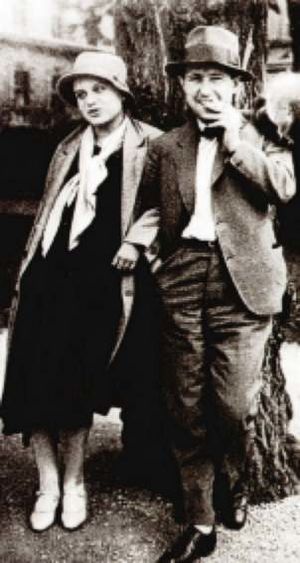Karel Teige facts for kids
Quick facts for kids
Karel Teige
|
|
|---|---|

Teige with Toyen in 1925
|
|
| Born | 13 December 1900 Prague, Austria-Hungary |
| Died | 1 October 1951 (aged 50) Prague, Czechoslovakia |
| Occupation | Publicist, literary critic |
| Nationality | Czech |
| Relatives | Josef Teige (father) |
Karel Teige (born December 13, 1900 – died October 1, 1951) was a very important Czech artist, writer, and critic. He was a key figure in the modern art movements of the 1920s and 1930s. He was part of a group called Devětsil (which means Butterbur) in the 1920s. Teige also worked as an editor and graphic designer for their magazine, ReD. One of his most famous books about how buildings should be designed is called The Minimum Dwelling (1932).
Contents
Life and Work
Karel Teige was born in Prague, which was then part of Austria-Hungary. He worked hard to bring new and modern art ideas to Prague.
Bringing Modern Art to Prague
Through the Devětsil group, Teige helped organize art shows and events. This brought famous international artists like Le Corbusier (an architect), Man Ray (a photographer), Paul Klee (a painter), and Walter Gropius (who founded the Bauhaus school) to Prague. They came to give talks and perform. Teige helped explain their work to people in the Czech Republic.
A famous French artist named André Breton once said that Teige had a "perfect intellectual fellowship" with him. This meant they understood each other very well and shared similar ideas about art.
Art and Design Projects
In 1926, Teige helped create a book called Abeceda (meaning 'Alphabet'). This book had poems by Vítězslav Nezval, one for each letter. Teige designed the book using a special technique called photomontage. This is where different photographs are put together to create one image.
The photographs in the book were taken by Karel Paspa. They showed a dancer named Milča Mayerová. She had created a dance to go with Nezval's poems, and the photos were like still pictures from her performance.
Views on Architecture
Even though Teige was not an architect himself, he was a very smart and clear-thinking critic of architecture. He was active in a group called CIAM, which discussed modern architecture. He was also friends with Hannes Meyer, who was the second director of the famous Bauhaus school.
From 1929 to 1930, Teige even gave guest lectures at the Bauhaus in Dessau, Germany. At the same time, he helped start a political group in Czechoslovakia called the Left Front.
Teige and Meyer both believed that buildings should be designed in a scientific and practical way. This idea is called functionalism. They thought that buildings should be useful first and foremost.
In 1929, Teige famously criticized a project by Le Corbusier called the Mundaneum. Teige felt that Le Corbusier was moving away from practical design and becoming too focused on just making things look stylish. Teige believed that modern architecture's main goal was to solve problems in a scientific and logical way.
Later Life and Challenges
After World War II, when the Soviet army came to Czechoslovakia, Teige initially welcomed them. However, in 1948, the new Communist government stopped him from publishing his work.
Karel Teige died in Prague in 1951 from a heart attack. It is said that he was under a lot of stress because of strong criticism from the Soviet press. His writings were not allowed to be shared for many decades after his death.
Writings
Karel Teige wrote many important books and studies about art, architecture, and culture.
Selected Works
- Stavba a báseň (Building and Poem) (1927)
- Svět, který se směje (The World That Laughs) (1928)
- Nejmenší byt (The Minimum Dwelling) (1932) – This book was later translated into English.
- Architektura pravá a levá (Right and Left Architecture) (1934)
- Moderní fotografie v Československu (Modern Photography in Czechoslovakia) (1947)
Many of his works were later translated into English, making his ideas available to a wider audience around the world.
See also
 In Spanish: Karel Teige para niños
In Spanish: Karel Teige para niños
 | Jewel Prestage |
 | Ella Baker |
 | Fannie Lou Hamer |

